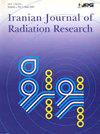基于磁共振放射治疗的新型大视场体对磁共振图像几何畸变的评价
Q4 Health Professions
引用次数: 0
摘要
背景:基于磁共振成像(MRI)的放疗计划方法,由于MRI的优势和两种图像模式规划的问题,近年来得到了广泛的研究。核磁共振放射治疗的第一步是评估磁共振图像的几何畸变。因此,本研究旨在利用一种新的大视场幻像来评估系统相关的几何畸变。材料与方法:用自制的有机玻璃片和含水的塑料管制作假体,用于评估MR图像失真。幻影尺寸为48×48×37 cm,包括325根水管。该研究评估了60厘米孔径MAGNETOM®Symphony Syngo 1.5 T (Siemens)的四种不同方案。结果:当视场距离小于10 cm(视场距离为20 cm)时,所有方案的畸变量均在2 mm以下,但当视场距离大于10 cm时畸变量增加,当视场距离大于25 cm时畸变量达到5 cm左右。结论:每个磁共振扫描仪的几何畸变已被证明依赖于射频(RF)序列脉冲(自旋回波或梯度回波)和图像参数(回波时间(TE),重复时间(TR)和接收器带宽)。对于视场<20 cm(头部区域)的几何畸变可以忽略不计,在MR放疗前必须对更多视场进行评估和校正。本文章由计算机程序翻译,如有差异,请以英文原文为准。
Geometric distortion evaluation of magnetic resonance images by a new large field of view phantom for magnetic resonance based radiotherapy purposes
Background: The magnetic resonance imaging (MRI)-based radiotherapy planning method have been considered in recent years because of the advantages of MRI and the problems of planning with two images modality. The first step in MRI-based radiotherapy is to evaluate magnetic resonance (MR) images geometric distortion. Therefore, the present study aimed to evaluate system related geometric distortion by a new large field of view phantom. Materials and Methods: A homemade phantom with Perspex sheets and plastic pipes containing water was built for evaluating MR images distortion. The phantom size is 48×48×37 cm and includes 325 water pipes. The study evaluated four different protocols from a 60 cm bore MAGNETOM® Symphony Syngo 1.5 T (Siemens). Results: It was found that the amount of distortion for all protocols is under 2 mm for the radial distances less than 10 cm (field of view (FOV) = 20 cm), but distortion increased in radial distances greater than 10 cm, and reached about 5 cm for radial distances greater than 25 cm. Conclusion: Geometric distortion of each MR scanner has been shown to be dependent on the radio frequency (RF) sequence pulse (Spin echo or Gradient echo) and image parameters (echo time (TE), repetition time (TR), and receiver band-width)). The geometric distortion could be ignored for the FOV<20 cm (for the head region), and must be evaluated and corrected for more FOVs before the MR only radiotherapy.
求助全文
通过发布文献求助,成功后即可免费获取论文全文。
去求助
来源期刊

Iranian Journal of Radiation Research
RADIOLOGY, NUCLEAR MEDICINE & MEDICAL IMAGING-
CiteScore
0.67
自引率
0.00%
发文量
0
审稿时长
>12 weeks
期刊介绍:
Iranian Journal of Radiation Research (IJRR) publishes original scientific research and clinical investigations related to radiation oncology, radiation biology, and Medical and health physics. The clinical studies submitted for publication include experimental studies of combined modality treatment, especially chemoradiotherapy approaches, and relevant innovations in hyperthermia, brachytherapy, high LET irradiation, nuclear medicine, dosimetry, tumor imaging, radiation treatment planning, radiosensitizers, and radioprotectors. All manuscripts must pass stringent peer-review and only papers that are rated of high scientific quality are accepted.
 求助内容:
求助内容: 应助结果提醒方式:
应助结果提醒方式:


